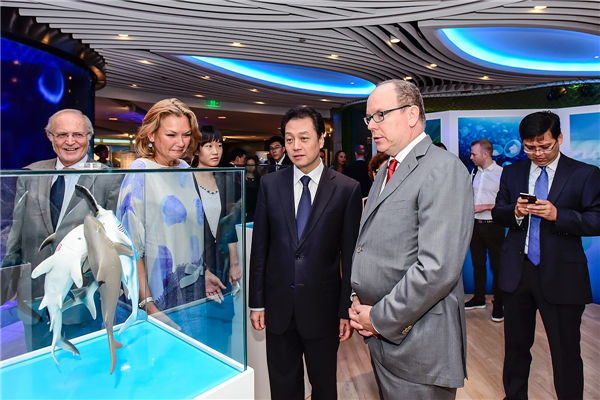A new wave of concern for ocean conservation
 |
|
Prince Albert II of Monaco (right) attends a TEDx event on marine-ecosystem preservation in Beijing. Provided to China Daily |
Talk of pollution is often not only in, but also about, the air.
Far less discussed is the protection of ocean, which has a royal defender - Prince Albert II of Monaco, who recently visited Beijing's Salon Monaco auditorium and spoke at a TEDx event, alongside Chinese and international environmentalists.
The event, Oceans: Innovation and Conservation, delved into challenges and solutions to issues related to marine-ecosystem preservation. It was organized by the Parkview Green Arts Action and Prince Albert II of Monaco Foundation.
Oceans occupy 71 percent of the Earth's surface and provide half the planet's oxygen, but only 3 percent is protected, the foundation says.
The prince stressed China's importance to ocean protection in his speech. He also reiterated Monaco's dedication to this mission.
"We depend on the seas, which are at the heart of civilization as they have been throughout history," he says.
"The future of China and of the world is centered on the seas. But these seas are today in danger."
The TEDx event came after the opening of the exhibition Oceans: An Invitation to the Dream, A Promise of Adventure, which is inspired by French director Jacques Perrin's film, Oceans.
The show displays works of about a dozen photographers that showcase the dynamics of the underwater world and how human actions damage it.
Oceans are important resources of ecological and economic value. And they provide energy and food, the prince says.
WildAid China's chief representative May Mei discussed at the event how her organization has launched influential media campaigns against shark-fin soup - once a popular dish, especially among the wealthy.
The campaign enlisted such celebrities as gymnast Li Ning, basketball legend Yao Ming, and actors Jackie Chan and Wu Xiubo.
"It seemed impossible to change people's eating habits that have been around for thousands of years. But we should at least try," she says.
Enric Sala, National Geographic explorer-in-residence and initiator of the Pristine Seas project, spoke about the organization's mission to "find, survey and help protect the last wild places in the ocean".
"We are taking fish out of the ocean faster than they can reproduce, and we are starting with the top breeds, the big fish on top of the food chain, including the sharks," he says.
Ma Jun, an environmentalist and 2014 Water Awardee of the Prince Albert II of Monaco Foundation, shared how his organization, the Institute of Public and Environmental Affairs, monitors China's water pollution with its China Water Pollution Map, a nationwide database of water conditions.
"Everybody can take part in the protection of the ocean in their own way. All this starts from transparency and public participation." he says.






















